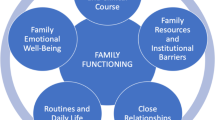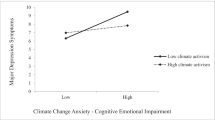Abstract
Although families can be a source of support post-disaster, depending on how they communicate about their stress, their attempts at support can be helpful or harmful. This study explored the moderating role of topic avoidance and co-rumination on post-disaster mental health (MH) in a sample of 485 parent-child dyads following severe floods affecting Texas. Parents (69.0% female) and their oldest child between the ages of 10–19 years (M = 13.75 years, SD = 2.56) completed online surveys approximately one-year post-flooding. Participants reported their flood exposure, life stressors since the disaster, topic avoidance, co-rumination, and MH symptoms (posttraumatic stress symptoms [PTSS], depression, anxiety). Structural equation models tested a moderated-mediation model of whether communication processes moderated the associations of flood exposure and life stressors on MH. They did not moderate the association of flood exposure to PTSS, but did have a moderating role for depression and anxiety. At low levels of topic avoidance, there was no association between flood exposure and child anxiety or depression. However, at mean and high levels of topic avoidance, there was a significant, positive association between flood exposure and child anxiety and depression. Co-rumination impacted both parents and children. For parents, there was no association between flood exposure and depression or anxiety when co-rumination was low or mean-level. However, flood exposure increased risk for depression and anxiety at high levels of co-rumination. A similar pattern emerged for children. Results for life stressors were nuanced. Overall, this suggests that communication can influence post-disaster MH.




Similar content being viewed by others
References
Afifi, T. D., Afifi, W. A., Morse, C. R., & Hamrick, K. (2008). Adolescents' avoidance tendencies and physiological reactions to discussions about their parents' relationship: Implications for postdivorce and nondivorced families. Communication Monographs, 75, 290–317. https://doi.org/10.1080/03637750802342308.
Afifi, W. A., Gangi, K., Blascovich, J., Afifi, T. A., Cornik, J., Merrill, A., Ryan, W., & Sterling, K. (2016). Mothers' impact on their daughters' cardiovascular reactivity in a high-threat context: An immersive virtual environment study. Human Communication Research, 42, 371–395. https://doi.org/10.1111/hcre.12085.
Afifi, T. D., Shahnazi, A., Coveleski, S., Davis, S., & Merrill, A. (2017). Testing the ideology of openness: The comparative effects of talking, writing, and avoiding a stressor on rumination and health. Human Communication Research, 43, 76–101. https://doi.org/10.1111/hcre.12096.
Ames-Sikora, A., Donohue, M., & Tully, E. (2017). Nonlinear associations between co- rumination and both social support and depression symptoms. The Journal of Psychology, 151, 597–612. https://doi.org/10.1080/00223980.2017.1372345.
Askew, C., Reynolds, G., Fielding-Smith, S., & Field, A. P. (2016). Inhibition of vicariously learned fear in children using positive modeling and prior exposure. Journal of Abnormal Psychology, 125, 279–291. https://doi.org/10.1037/abn0000131.
Bonanno, G. A., Brewin, C. R., Kaniasty, K., & La Greca, A. M. (2010). Weighing the costs of disaster: Consequences, risks, and resilience in individuals, families, and communities. Psychological Science in the Public Interest, 11, 1–49. https://doi.org/10.1177/1529100610387086.
Carpenter, A. L., Elkins, R. M., Kerns, C., Chou, T., Green, J. G., & Comer, J. S. (2017). Event-related household discussions following the Boston marathon bombing and associated posttraumatic stress among area youth. Journal of Clinical Child & Adolescent Psychology, 46, 331–342. https://doi.org/10.1080/15374416.2015.1063432.
Caughlin, J., & Golish, T. (2002). An analysis of the association between topic avoidance and dissatisfaction: Comparing perceptual and interpersonal explanations. Communication Monographs, 69, 275–296. https://doi.org/10.1080/03637750216546.
Caughlin, J., Mikucki-Enyart, S., Middleton, A., Stone, A., & Brown, L. (2011). Being open without talking about it: A rhetorical/normative approach to understanding topic avoidance in families after a lung cancer diagnosis. Communication Monographs, 78, 409–436. https://doi.org/10.1080/03637751.2011.618141.
Center for Research on the Epidemiology of Disaster. (2019). Natural disasters 2018. Brussels: Center for Research on the Epidemiology of Disaster https://emdat.be/sites/default/les/adsr_2018.pdf.
Derogatis, L. R., Lipman, R. S., Rickels, K., Uhlenhuth, E. H., & Covi, L. (1974). The Hopkins symptom checklist (HSCL): A self-report symptom inventory. Behavioral Science, 19, 1–15. https://doi.org/10.1002/bs.3830190102.
Donovan-Kicken, E., & Caughlin, J. (2011). Breast cancer patients’ topic avoidance and psychological distress: The role of coping. Journal of Health Psychology, 16, 596–606. https://doi.org/10.1177/1359105310383605.
Felix, E. D., Hernández, L. A., Bravo, M., Ramírez, R., Cabiya, J., & Canino, G. (2011). Natural disaster and risk of psychiatric disorders in Puerto Rican children. Journal of Abnormal Child Psychology, 39, 589–600. https://doi.org/10.1007/s10802-010-9483-1.
Felix, E. D., You, S., Vernberg, E., & Canino, G. (2013). Family influences on the long term post-disaster recovery of Puerto Rican youth. Journal of Abnormal Child Psychology, 41, 111–124.
Felix, E. D., Afifi, T., Kia-Keating, M., Brown, L., Afifi, W., & Reyes, G. (2015). Family functioning and posttraumatic growth among parents and youth following wildfire disaster. American Journal of Orthopsychiatry, 85, 191–200.
Felix, E. D., Binmoeller, C., Nylund-Gibson, K., Benight, C. C., Benner, A., & Terzieva, A. (2019). Addressing disaster exposure measurement issues with latent class analysis. Journal of Traumatic Stress, 32, 56–66. https://doi.org/10.1002/jts.22368.
Felix, E. D., Nylund-Gibson, K., Kia-Keating, M., Liu, S., Binmoeller, C., & Terzieva, A. (2020). The influence of flood exposure and subsequent stressors on youth social-emotional health. American Journal of Orthopsychiatry, 90(2), 161–170. https://doi.org/10.1037/ort000418.
Flanagan, J. C., Jaquier, V., Overstreet, N., Swan, S., & Sullivan, T. (2014). The mediating role of avoidance coping between IPV victimization, mental health, and substance abuse among women experiencing bidirectional IPV. Psychiatry Research, 220, 391–396. https://doi.org/10.1016/j.psychres.2014.07.065i.
Freedy, J. R., Kilpatrick, D. G., & Resnick, H. S. (n.d.). The psychological impact of the Oakland Hills fire: Final report. Charleston: Medical University of South Carolina.
Furr, J. M., Comer, J. S., Edmunds, J. M., & Kendall, P. C. (2010). Disasters and youth: A meta-analytic examination of posttraumatic stress. Journal of Consulting and Clinical Psychology, 78, 765–780. https://doi.org/10.1037/a0021482.
Giannopoulou, I., Smith, P., Ecker, C., Strouthos, M., Dikaiakou, A., & Yule, W. (2006). Factor structure of the children's revised impact of event scale (CRIES) with children exposed to earthquake. Personality and Individual Differences, 40, 1027–1037. https://doi.org/10.1016/j.paid.2005.11.002.
Ginexi, E. M., Weihs, K., Simmens, S. J., & Hoyt, D. R. (2000). Natural disaster and depression: A prospective investigations of reactions to the 1993 Midwest floods. American Journal of Community Psychology, 28, 495–518. https://doi.org/10.1023/A:1005188515149.
Harvey, J., Manusov, V., & Sander, E. (2019). Improving cancer caregivers’ emotion regulation and supportive message characteristics: Results of a randomized controlled expressive writing intervention. Communication Monographs, 86, 1–22. https://doi.org/10.1080/03637751.2018.1521983.
Hendrickson, M. L., Abel, M. R., Vernberg, E. M., McDonald, K. L., & Lochman, J. E. (2019). Caregiver-adolescent co-reminiscing and adolescents’ individual recollections of a devastating tornado: Associations with enduring posttraumatic stress symptoms. Development and Psychopathology, 32, 1–11. https://doi.org/10.1017/S0954579418001487.
Houston, J. B., & Franken, N. J. (2015). Disaster interpersonal communication and posttraumatic stress following the 2011 Joplin, Missouri, tornado. Journal of Loss and Trauma, 20, 195–206. https://doi.org/10.1080/15325024.2013.848614.
Izaguirre, A., & Cater, A. (2018). Child witnesses to intimate partner violence: Their descriptions of talking to people about the violence. Journal of Interpersonal Violence, 33, 3711–3731. https://doi.org/10.1177/0886260516639256.
Kaniasty, K., & Norris, F. H. (2004). Social support in the aftermath of disasters, catastrophes, and acts of terrorism: Altruistic, overwhelmed, uncertain, antagonistic, and patriotic communities. In R. J. Ursano, A. E. Norwood, & C. S. Fullerton (Eds.), Bioterrorism: Psychological and public health interventions (pp. 200–229). Cambridge: Cambridge University Press.
Kelly, A., & Macready, D. (2009). Why disclosing to a confidant can be so good (or so bad) for us. In T. D. Afifi & W. A. Afifi (Eds.), Uncertainty, information management, and disclosure decisions: Theories and applications (pp. 384–402). New York: Routledge.
Kohler, M., Schafer, H., Goebel, S., & Pederson, A. (2018). The role of disclosure attitudes in the relationship between posttraumatic stress disorder symptom severity and perceived social support among emergency service workers. Psychiatry Research, 270, 602–610. https://doi.org/10.1016/j.psychres.2018.10.049.
La Greca, A. M., Silverman, W. K., Vernberg, E. M., & Prinstein, M. J. (1996). Symptoms of posttraumatic stress in children after hurricane Andrew: A prospective study. Journal of Consulting and Clinical Psychology, 64, 712–723. https://doi.org/10.1037/0022-006X.64.4.712.
Lane, J. D., & Wegner, D. M. (1995). The cognitive consequences of secrecy. Journal of Personality and Social Psychology, 69, 237–253. https://doi.org/10.1037/0022-3514.69.2.237.
Muthén, L. K., & Muthén, B. O. (1998-2017). Mplus user's guide (Eighth Ed.). Los Angeles: Muthén & Muthén.
Nettelbladt, P., Hansson, L., Stefansson, C. G., Borgquist, L., & Nordström, G. (1993). Test characteristics of the Hopkins symptom check List-25 in Sweden, using the present state examination (PSE-9) as a caseness criterion. Social Psychiatry and Psychiatric Epidemiology, 28, 130–133.
Norris, F. H., Friedman, M. J., Watson, P. J., Byrne, C. M., Diaz, E., & Kaniasty, K. (2002). 60,000 disaster victims speak: Part 1. An empirical review of the empirical literature, 1981-2001. Psychiatry, 65, 207–239. https://doi.org/10.1521/psyc.65.3.207.20173.
Orom, H., Cline, R. J. W., Hernandez, T., Berry-Bobovski, L., Schwartz, A. G., & Ruckdeschel, J. C. (2012). A typology of communication dynamics in families living a slow-motion technological disaster. Journal of Family Issues, 33, 1299–1323. https://doi.org/10.1177/0192513X11430821.
Pagani, A., Donato, S., Parise, M., Bertoni, A., Iafrate, R., & Schoebi, D. (2019). Explicit stress communication facilitates perceived responsiveness in dyadic coping. Frontiers in Psychology, 10, 401–410. https://doi.org/10.3389/fpsyg.2019.00401.
Perrin, S., Meiser-Stedman, R., & Smith, P. (2005). The children's revised impact of event scale (CRIES): Validity as a screening instrument for PTSD. Behavioural and Cognitive Psychotherapy, 33, 487–498. https://doi.org/10.1017/S1352465805002419.
Roloff, M. E., & Ifert, D. E. (2000). Conflict management through avoidance: Withholding complaints, suppressing arguments, and declaring topics taboo. In S. Petronio (Ed.), Balancing the secrets of private disclosures (pp. 151–179). Mahwah: Lawrence Erlbaum Associates.
Rose, A. J. (2002). Co-rumination in the friendships of girls and boys. Child Development, 73, 1830–1843. https://doi.org/10.1111/1467-8624.00509.
Rose, A., Glick, G., Smith, R., Schwartz-Mette, R., & Borowski, S. (2017). Co-rumination exacerbates stress generation among adolescents with depressive symptoms. Journal of Abnormal Child Psychology, 45, 985–995. https://doi.org/10.1007/s10802-016-0205-1.
Rubens, S. L., Felix, E. D., & Hambrick, E. P. (2018). A meta-analysis of the impact of natural disasters on internalizing and externalizing symptoms in youth. Journal of Traumatic Stress, 31, 332–341. https://doi.org/10.1002/jts.22292.
Schwartz-Mette, R., & Smith, R. (2018). When does co-rumination facilitate depression contagion in adolescent friendships? Investigating intrapersonal and interpersonal factors. Journal of Clinical Child and Adolescent Psychology, 47, 912–924. https://doi.org/10.1080/15374416.2016.1197837.
Smith, R. L., & Rose, A. J. (2011). The “cost of caring” in youths’ friendships: Considering associations among social perspective taking, co-rumination, and empathic distress. Developmental Psychology, 47, 1792–1803. https://doi.org/10.1037/a0025309.
Stone, L. B., Uhrlass, D. J., & Gibb, B. E. (2010). Co-rumination and lifetime history of depressive disorders in children. Journal of Clinical Child and Adolescent Psychology, 39, 597–602. https://doi.org/10.1080/15274416.2010.486323.
Thoresen, S., Tambs, K., Hussain, A., Heir, T., Johansen, V. A., & Bisson, J. I. (2010). Brief measure of posttraumatic stress reactions: Impact of event Scale-6. Social Psychiatry and Psychiatric Epidemiology, 45, 405–412. https://doi.org/10.1007/s00127-009-0073-x.
van Emmerik, A. A. P., Kamphuis, J. H., Hulsbosch, A. M., & Emmelkamp, P. M. G. (2002). Single session debriefing after psychological trauma: A meta-analysis. The Lancet, 360, 766–771. https://doi.org/10.1016/S0140-6736(02)09897-5.
Wang, L., & Zhang, Z. (2011). Estimating and testing mediation effects with censored data. Structural Equation Modeling, 18, 18–34. https://doi.org/10.1080/10705511.2011.534324.
Weiss, D. S., & Marmar, C. R. (1997). The impact of event scale—Revised. In J. P. Wilson & T. M. Keane (Eds.), Assessing psychological trauma and PTSD (pp. 399–411). New York: Guilford Press.
Yule, W. (1997). Anxiety, depression, and post-traumatic stress in childhood. In I. Sclare (Ed.), Child psychology portfolio. NFER-Nelson: Windsor.
Funding
This study was funded through 1R03HD077164-01A1 the National Institute of Child Health and Human Development.
Author information
Authors and Affiliations
Corresponding author
Ethics declarations
Conflict of Interest
The authors declare they have no conflicts of interest.
Additional information
Publisher’s Note
Springer Nature remains neutral with regard to jurisdictional claims in published maps and institutional affiliations.
Electronic supplementary material
ESM 1
(DOCX 28161 kb)
Rights and permissions
About this article
Cite this article
Felix, E.D., Afifi, T.D., Horan, S.M. et al. Why Family Communication Matters: the Role of Co-rumination and Topic Avoidance in Understanding Post-Disaster Mental Health. J Abnorm Child Psychol 48, 1511–1524 (2020). https://doi.org/10.1007/s10802-020-00688-7
Published:
Issue Date:
DOI: https://doi.org/10.1007/s10802-020-00688-7




